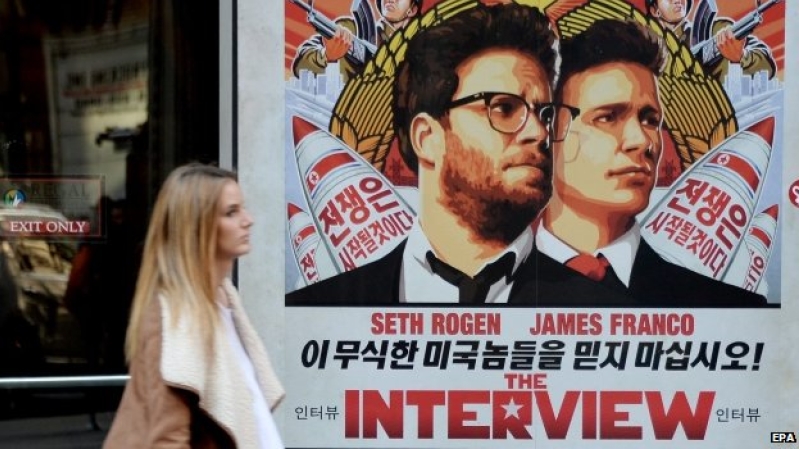
President Obama announced Friday afternoon that the United States will respond "proportionally" to the attack on Sony Pictures Entertainment after the FBI pinned the blame on the North Korean government.
Although he declined to elaborate on what actions he will take against North Korea, the president said in an end-of-year news conference that Sony should not have fallen to pressure into cancelling the release of the comedy film The Interview in U.S. theaters.
"I think they made a mistake," Obama said.
The president said that North Korea appeared to have acted alone. According to Steve Holland and Matt Spetalnick of Reuters, FBI investigators had determined that North Korea's actions fell "outside the bounds of acceptable state behavior."
"We will respond," Obama said. "We'll respond proportionally, and we'll respond in a place and time and manner that we choose."
Obama thought Sony's decision to yank the movie altogether could set a bad precedent.
"We cannot have a society in which some dictator someplace can start imposing censorship here in the United States," Obama said. "Because if somebody is able to intimidate folks out of releasing a satirical movie, imagine what they start doing when they see a documentary that they don't like, or news reports that they don't like."
According to Jake Miller of CBS News, Obama emphasized the importance of international cooperation to develop "rules of the road" for cybersecurity, noting that the Internet is "sort of the wild west." Reuters reported that Washington started consulting with Japan, China, South Korea and Russia in figuring out how to counter North Korea's cyber activities.
"It was the first time the United States had directly accused another country of a cyber-attack of such magnitude on American soil and set up a possible new confrontation between longtime foes Washington and Pyongyang," Holland and Spetalnick wrote.
In order to make international cooperation possible, Obama asked Congress to pass a bill to allow for "information-sharing."
"If we don't put in place the kind of architecture that can prevent these attacks from taking place, this is not just going to be affecting movies," Obama warned. "This is going to be affecting our entire economy in ways that are extraordinarily significant."
Several members of Congress came up with a few ideas regarding the U.S. response. According to CBS News, outgoing chairman of the Senate Foreign Relations Committee Sen. Bob Menendez, D-N.J., wrote a letter to Secretary of State John Kerry urging him to put North Korea back on the State Department's list of state-sponsored terrorism.
"Through cyber-attacks North Korea was able to inflict significant economic damage on a major international company," Menendez wrote. "In addition, in the face of violent cyber-threats, Sony Pictures made the decision not to release a motion picture which the North Korean regime found objectionable - in part due to coercive threats of 9/11 style attacks on theaters planning to show the film The Interview."
Menendez added that the action was "an unacceptable act of international censorship which curtails global artistic freedom."
House Foreign Affairs Committee Chairman Ed Royce, R-Calif., blamed the Obama administration for failing to take a harder line against the North Korean regime sooner. CBS News reported that he urged lawmakers to slap new sanctions on the isolated country.
"The new Congress must quickly pass the North Korea sanctions bill that the House sent to the Senate last July," Royce said in a statement. "The Administration's failure to impose the type of tough financial sanctions that hit the Kim regime hard in 2005, before they were unwisely ended, is more indefensible by the day. The regime must feel the great economic pressure these sanctions brought, and could bring again."
In his company's defense, Sony Pictures Entertainment chief executive and chairman Michael Lynton told CNN that "the president, the press and the public are mistaken" as to why Sony shelved The Interview.
"I don't know exactly whether he understands the sequence of events that led up to the movie not being shown in the movie theaters," Lynton said in response to Obama's remarks. "Therefore I would disagree with the notion that it was a mistake."
Lynton hinted to CNN that the theaters rejected showing the film altogether, leaving Sony with few alternatives.
"We do not own movie theaters," Lynton said. "We cannot determine whether or not a movie will be played in movie theaters."
However, in a statement released Friday, Sony indicated that the company might release The Interview "on a different platform."
"It is still our hope that anyone who wants to see this movie will get the opportunity to do so," Sony's statement said.
CNN reported that none of the potential distributors Sony is considering for the film's release, including Netflix, have responded to requests for comment.







